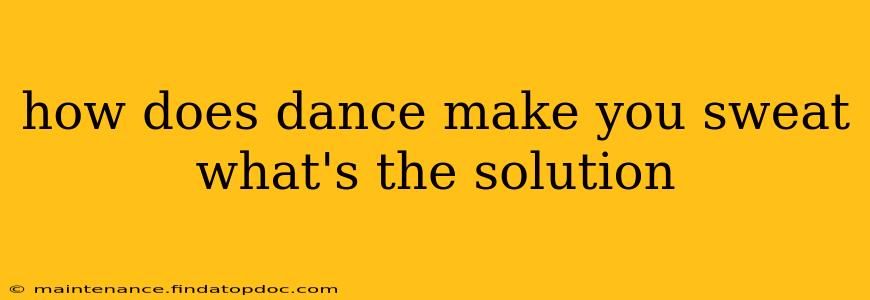How Does Dance Make You Sweat? The Science Behind the Sweat
Dance, in all its vibrant forms, is a fantastic full-body workout. But why does it make you sweat so much? Understanding the physiological reasons behind this helps appreciate the benefits and manage the resulting moisture. This article explores the science behind dance-induced sweating, offering solutions to manage it effectively.
What causes sweating during dance?
Sweating during dance is primarily due to your body's natural cooling mechanism. Intense physical activity like dancing elevates your core body temperature. To regulate this temperature and prevent overheating, your body activates its sweat glands. These glands release sweat, a mixture of water, electrolytes (like sodium and potassium), and urea. As this sweat evaporates from your skin, it cools your body down.
The amount of sweat produced depends on several factors:
- Intensity of the dance: High-intensity styles like hip-hop or Zumba will naturally produce more sweat than slower, more graceful forms like ballet.
- Duration of the dance: Longer dance sessions mean more time for your body to generate heat and thus more sweat.
- Ambient temperature and humidity: A hot and humid environment will make it harder for sweat to evaporate, leading to more sweating as your body works harder to cool down.
- Individual fitness level: Fitter individuals may sweat more efficiently because their cardiovascular systems are better at delivering blood (and therefore heat) to the skin's surface.
- Hydration levels: Dehydration can actually increase sweating as your body struggles to regulate temperature effectively.
Why does my sweat smell after dancing?
Sweat itself is odorless. The unpleasant smell comes from bacteria on your skin breaking down sweat components, particularly the proteins and fats. The more you sweat, the more opportunity bacteria have to work, resulting in a stronger odor.
How can I manage excessive sweating during dance?
Managing excessive sweating during dance involves a multi-pronged approach:
- Hydration: Drink plenty of water before, during, and after dancing to stay hydrated. Dehydration can lead to more sweating and potentially heat exhaustion.
- Appropriate attire: Wear breathable fabrics like cotton or performance fabrics designed to wick away moisture. Avoid tight-fitting clothing that traps heat and sweat.
- Proper ventilation: Dance in a well-ventilated space with good air circulation to aid sweat evaporation.
- Hygiene: Showering regularly and using antiperspirants or deodorants can help manage odor. Choose products specifically designed for active individuals.
- Choosing the right dance style: If you find yourself consistently overwhelmed by sweating, consider transitioning to less intense dance styles for a while.
What if I'm worried about excessive sweating?
While sweating during dance is normal, excessive sweating (hyperhidrosis) can be a symptom of underlying medical conditions. If you're concerned about the amount you sweat, or if you experience other symptoms like dizziness or fatigue, it's important to consult a doctor.
What is the best way to prevent body odor after dancing?
Combining proper hygiene with suitable clothing and antiperspirant/deodorant usage is key. Showering immediately after dancing, using an antibacterial soap, and applying deodorant to clean, dry skin will significantly reduce body odor.
In conclusion, understanding why dance makes you sweat is crucial for managing it effectively and ensuring you can enjoy your dancing without discomfort. By addressing hydration, clothing, and hygiene, you can minimize the impact of sweat and focus on the joy of movement. Remember, consultation with a medical professional is advisable if you have any concerns beyond the expected level of exertion-related sweating.
